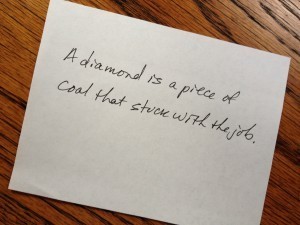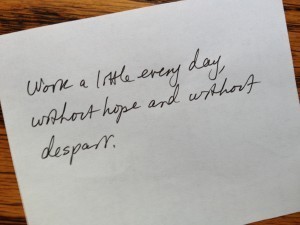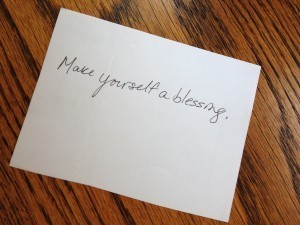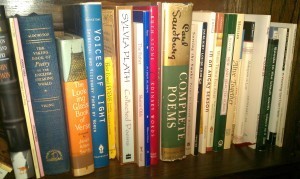Alison McGhee's Blog, page 22
September 14, 2013
Poem of the Week, by Richard Kenney
- Richard Kenney
I tried lacing loss into these lines,
thinking to bind it safely there.
But when much lifetime had raced by I
saw rather
trapped in the scrag noose, too,
joy and daylight.
I bottled also bile in these poems,
thinking to isolate
the toxin. But when much lifetime had raced by I
found it on the mantel.
I thought to lower these poems into a salt dome—
stable, it’s said, for aeons.
And who isn’t one?
Once
I tried to write invisibly,
but all lifetime is a candle.
–
For more information on Richard Kenney, please click here: http://www.poetryfoundation.org/bio/r...
–
My Facebook page: http://www.facebook.com/home.php?#!/pages/Alison-McGhee/119862491361265?ref=ts
September 8, 2013
Miniature Torta #4: Three Words
“Sublime.”
A long time ago. A house that I used to live in, being repainted by two house painters. One of them a young man with red-blonde hair, newly diabetic, still figuring out how to live with it. Sometimes he started to crash, so I kept the door unlocked and orange juice in the refrigerator for him.
His partner: a young man with dark hair that came down to his shoulders and brown eyes and a smooth, tan face. His handsomeness inseparable from the sense of calm and happiness that surrounded him.
It was fall. A stretch of crisp golden-leaved days. One afternoon I walked onto the porch as they were cleaning up to go home. The brown-eyed painter saw me standing there, looking out at the maple, turning itself to flame, and smiled.
“Sublime,” he said.
I hear the word sublime now and it is him I see in my mind, his face tilted to that blue, blue September sky.
* * *
“Okay.”
Many years ago, when I first moved to Minneapolis. A big urban high school where I taught Chinese for four years. One of my students: tall and lean, a basketball player. Smart –not in a bookish way– and funny. He flirted with all the girls, including me.
One day he didn’t show up in class. Word filtered through school that his father had died the previous night from a heart attack.
When the last bell rang I sat at my desk in the empty classroom, the door ajar. Suddenly there he was, poking his face around the doorframe, his irrepressible grin on his face.
“Hey Mai Laoshi,” he said (Mai Laoshi was my Chinese teaching name).
There he stood, smiling at me, his voice normal. But it was as if the air was shaking around him. I could almost see it, vibrating. I pushed myself up from the desk and put my arms around him.
“I’m so sorry. I’m so, so sorry.”
“It’s okay,” he said. “It’s okay, Mai Laoshi.”
It’s okay, Mao Laoshi.
That word okay, does it ever really mean “all right”? Most of the time it’s like a spoken punctuation mark. A sound meant to put a pause in something, an acknowledgment of something that’s not okay at all, a word meant to get you from someplace you don’t want to be to another, different place.
When I hear the phrase It’s okay, it’s okay, it’s that boy’s face that I see, peeking around the door of my empty classroom.
* * *
“Dinosaurs.”
Spring. A two year old boy. A back yard garden overrun with ferns just beginning to unfurl themselves. A young mother hauling bag after bag of groceries from the car into the house.
“Come on, little guy, let’s get into the house now.”
But he was stopped by the overgrown patch of yard, bent over and laughing. Pointing.
“Dinosaurs!” he said. “Dinosaurs.”
I bent down so I was as short as him and followed his pointing finger. It took me a minute, but then I finally understood: the ferns uncurling, bent under the weight of their own fronds, looked just like the T-Rexes that he was currently obsessed with.
Dinosaurs. They’re everywhere.
September 7, 2013
Poem of the Week, by Tony Hoagland
- Tony Hoagland
Down near the bottom
of the crossed-out list
of things you have to do today,
between “green thread”
and “broccoli” you find
that you have penciled “sunlight.”
Resting on the page, the word
is beautiful, it touches you
as if you had a friend
and sunlight were a present
he had sent you from some place distant
as this morning—to cheer you up,
and to remind you that,
among your duties, pleasure
is a thing
that also needs accomplishing.
Do you remember?
that time and light are kinds
of love, and love
is no less practical
than a coffee grinder
or a safe spare tire?
Tomorrow you may be utterly
without a clue
but today you get a telegram,
from the heart in exile
proclaiming that the kingdom
still exists,
the king and queen alive,
still speaking to their children,
—to any one among them
who can find the time,
to sit out in the sun and listen.
–
For more information about Tony Hoagland, please click here: http://www.poetryfoundation.org/bio/tony-hoagland
–
My Facebook page: http://www.facebook.com/home.php?#!/pages/Alison-McGhee/119862491361265?ref=ts
September 6, 2013
Miniature Torta #3: “The Voyage of Life”
 My mother, an only child born and raised in Manhattan by poor but arts-loving parents, tried her best to instill an appreciation of culture in her own children. This was a strictly uphill battle.
My mother, an only child born and raised in Manhattan by poor but arts-loving parents, tried her best to instill an appreciation of culture in her own children. This was a strictly uphill battle.
She used to sign us up for things against our will, such as the symphony usherette program in Utica, 20 miles south. Being a Symphony Usherette meant escorting symphony attendees to their seats, with the reward of listening to the concert for free.
Sounds good, right? But we were semi-feral teenagers, raised in the woods, and we resisted her efforts by 1) never really learning the seating layout of the auditorium, thereby leading elderly patrons up and down various aisles while apologizing profusely, and 2) fleeing to the nearest McDonald’s in our long dresses the minute the orchestra started up.
The one thing she did that actually worked, though, was to take us to the Munson Williams Proctor Museum of Art. We went there a lot. I can still see the galleries in my mind. Our mother didn’t try to teach us anything about art; she just let us wander around. My sisters and I were transfixed from an early age by The Voyage of Life, a series of paintings by a man named Thomas Cole. Childhood, Youth, Manhood, Old Age. They were huge, majestic, old-school paintings. That’s the Childhood one up at the top of this post.
My whole life I have thought about those paintings. I loved them as a child, but they also disturbed me. That sense of inevitability, the passage of time, progressing from Childhood to Old Age. And the last one always felt to me as if the artist had stroked pain out onto that canvas. Resignation. Loss.
The last time I was at Munson Williams was many years ago. I pushed my grandmother around in a wheelchair and we admired the art. There was the Voyage of Life, in its customary place. I remember resolutely pushing her past the last one.
I wish I could paint, the same way I wish I could write music. Thomas Cole knew exactly what he was doing, even though he painted the Voyage of Life when he was a young man.
The closest thing I have to the Voyage of Life are the quotes I have taped to my computer over the years. There have been only three.
A diamond is a piece of coal that stuck with the job.
That one stayed on the computer for ten or so years.
Write a little every day, without hope and without despair.
That one also lasted maybe ten years.
There must have come a day when Thomas Cole looked at his fourth painting –”Old Age”– and thought, Okay. I guess I can’t do any more. And then he must have put down his paintbrush and moved on to something else.
Now I’m on my third taped-up quote, a line I heard in a song by one of my favorite singers.
Make yourself a blessing.
That one’s still in progress. Maybe it’ll be the one that outlasts me. Some of us have oil paints and paintbrushes and giant canvases that hang in art museums where little girls stand before them, transfixed, absorbing something that they will never forget.
And some of us have Precise V7 Extra Fine Rolling Ball black pens and scratch paper that we scissor into quarters and use to jot down shopping lists and to-do lists and, once in a while, a quote that might last us the rest of our lives.
September 3, 2013
Miniature Torta #2: A nimbus-clouded voice
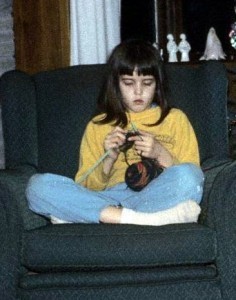 I walked into the Y this morning and saw an old friend at the other end of the room, next to the window, studying the instructions for a new machine. She lifted her hand and tucked her dark hair behind her ear. She looked young and fit.
I walked into the Y this morning and saw an old friend at the other end of the room, next to the window, studying the instructions for a new machine. She lifted her hand and tucked her dark hair behind her ear. She looked young and fit.
Happiness rushed through me at the sight of her, along with the feeling of Wow, how long has it been?
Then I realized that time had done one of its hiccups. The darkhaired woman across the room wasn’t the friend I was thinking about. I haven’t seen that particular friend, even though we live in the same city, in well over a decade. The woman I was looking at could have been her niece, or her much younger cousin.
Sometimes time picks you up and sets you down, momentarily, in another place. Another era. My old friend might not think about me anymore. The last time I saw her I was forging solo into new territory. Maybe it seemed too hard to maintain the friendship; maybe she wished I would stay put, in the place where she had always known me.
But as I stood there, looking at the familiar-looking stranger studying the machine across the room, I was suddenly back in the living room of an apartment I used to rent, back when I was struggling my way into that new life.
This was the last time I saw her. We were both sitting crosslegged on the floor and drinking red wine and she was telling me about something hard in her life. I could hear her voice, which I remember as calm and bell-like, as if all the vowels became somehow rounded and soft when they emerged from her throat into the air.
Her voice had the texture of what I imagine bubbles from a bubble-pipe would feel like if you could touch them without them popping. What a beautiful voice she had, I thought.
She must still have tha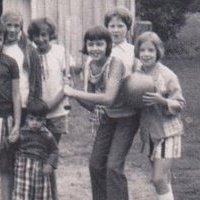 t voice.
t voice.
I left that room and went down to the weight room and started doing pull-ups, conjuring up people from my past, to see if their voices were still there. My grandmother, yes. As clear as if she were standing right there in the Y.
Do I hear her so clearly because of the six hours of video I took of her and then had transferred to a cd and then into my computer, so that sometimes, when I’m cooking or cleaning, I pull her up on the screen and she keeps me company?
No. At least I don’t think so. I’m pretty sure I will remember her voice forever and ever. But I don’t really know.
How about my best friend from childhood? She appears immediately in my mind, the way she would have looked in, say, fifth grade. Blonde hair, bangs, blue-blue eyes. She was a very small person but her voice was low, older than her years.
Was it, though? I try to listen, but I can only see her, standing in the framed-up doorway of her always-in-progress bedroom. Her voice is low and calm. I can hear it, and yet I can’t. The way I hear it is the way you remember a bubble drifting in the air, undulating in that rainbowy way, just before it vanishes. It’s the sense of a voice, but not the voice itself.
Try someone else. My friend Absalom, yes, I can hear his voice whenever I want, maybe because I spend a fair amount of time with him these days. But I distinctly remember driving to the airport to pick him up a few years ago. This would be the first time I had seen him since college, when we were great friends. 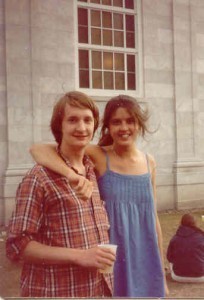
Will I even recognize him?, I remember thinking. And I also remember trying to conjure up his voice, there in the car as I drove down the highway to the airport. No. Nothing.
I pulled up to Baggage Claim and there he was, standing by a post, the same but not. Twenty and more years pass; how can someone not change? Then he called out Allie! and we both started laughing, and his voice came washing over me in that moment but also it came welling up from some deep reservoir of memory.
Now I’m picturing people from long ago in my mind and trying to conjure their voices. Some are there, others are lost. But are they really?
I’m thinking of my darkhaired friend’s voice as it was that night, the last time I saw her. Is that conversation –her soft words, filled with sorrow, and my responses– still somewhere in the world? Do the voices of everyone we know, everyone we loved, hang somewhere in the air after they’ve spoken? After they’re gone from the earth?
Does everything that rises converge, somewhere beyond where we can see and hear?
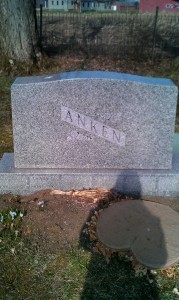 . . . In my darkest night,
. . . In my darkest night,
when the moon was covered
and I roamed through wreckage,
a nimbus-clouded voice
directed me . . .
Though I lack the art
to decipher it,
no doubt the next chapter
in my book of transformations
is already written.
I am not done with my changes.
August 31, 2013
Poem of the Week, by Archibald MacLeish
The Young Dead Soldiers, by Archibald MacLeish
The young dead soldiers do not speak.
Nevertheless, they are heard in
the still houses: who has not
heard them?
They have a silence that speaks for
them at night and when the clock
counts.
They say: We were young. We
have died. Remember us.
They say: We have done what we
could but until it is finished it is not
done.
They say: We have given our lives
but until it is finished no one can
know what our lives gave.
They say: Our deaths are not ours;
they are yours; they will mean what
you make them.
They say: Whether our lives and
our deaths were for peace and a
new hope or for nothing we cannot
say: it is you who must say this.
They say: We leave you our deaths.
Give them their meaning.
We were young, they say. We
have died. Remember us.�
–
For more information on Archibald MacLeish, please click here: http://www.poetryfoundation.org/bio/a...
–
My Facebook page: http://www.facebook.com/home.php?#!/pages/Alison-McGhee/119862491361265?ref=ts
August 27, 2013
Miniature Torta* #1: The Poetry Hut
First, read through some of the thousands of poems you’ve copied down over the years. Do not be surprised when you end up spending the entire morning doing this.
Find this one, by Hafiz:
With that Moon Language
Admit something:
Everyone you see, you say to them, “Love me.”
Of course you do not do this out loud,
otherwise someone would call the cops.
Still, though, think about this, this great pull in us to connect.
Why not become the one who lives with a full moon in each eye
that is always saying,
with that sweet moon language,
what every other eye in this world
is dying to hear?
Think about it, that great pull to connect. Think about how the longer you live, the more your life winnows itself down to wanting only that. Only connection. How it happens more intensely now, maybe because when you feel that pull toward someone, you don’t try to hide it. You talk, you listen, you touch. You don’t hold back.
Decide then and there to build a poetry hut. Ask your handyman Doug to build one for you. Laugh when he says, “I would consider it a public service, Alison.”
Paint the poetry hut when Doug delivers it. Dig a hole in your front yard with a spade, and when the hole gets too deep to lift the dirt out, kneel down and dig it out with your hands. Dig it as deep as your arms are long. Be glad that you manage to avoid utility wires and pipes.
Nail the hut to a 4×4 post. Heave the whole thing, hut and post, into the hole. Tilt it this way and that until it’s straight. Or straight enough.
Go buy some Quik-crete. Pour it into the red pail in the basement. Add some water. Stir it up immediately with a spoon. As soon as it’s mixed, scrape it into the post hole and mound it around the post.
Go to Hunt ‘n Gather and wander around the clutter of rooms until you find enough old children’s blocks to spell out P O E M S. Go to Bryant Hardware and buy some blue putty, the kind used to stick posters to walls. Stick a blob of blue putty on the back of each letter block and then press the puttied blocks onto the front of the poetry hut.
 Go back to your labyrinth of poetry, found everywhere in your house: in books, on scraps of paper, in your computer, in your heart.
Go back to your labyrinth of poetry, found everywhere in your house: in books, on scraps of paper, in your computer, in your heart.
Choose a few of your favorites and jigsaw-puzzle them into a columned file labeled Poetry Hut Poems. Print them out on colored paper. Scissor them apart.
Roll them up like tiny scrolls, offerings to the gods, and tie them with scraps of ribbon. Put them in a basket. Make a sign that says “Help yourself to a poem” and put the basket and the sign in the poetry hut.
Peer into the hut every day or so. Realize that 10-15 poems are disappearing per day. Replenish the basket when the supply dwindles. Be surprised and happy when small notes start appearing in the poetry hut, thank-you’s and smiley faces and even a “Haiku 4 U.”
Watch unseen from your porch as a woman with long burnished hair walks by with her dog, stops, opens the poetry hut door, selects a poem, unscrolls it, reads it, shakes her head and smiles, puts the poem in her back pocket.
Keep thinking about it, this great pull in us, to connect. [image error]
*Miniatures tortas: A series on poems. Or words. Or felicitous phrases. The title comes from my fabulous decision, a few months ago, to bake a cheesecake in muffin tins instead of a cheesecake pan, then freeze the miniature cheesecakes so that I could have one whenever I felt a cheesecake urge.
**But I’m calling them miniature tortas because somehow that seems better than miniature cheesecakes.
August 25, 2013
Poem of the Week, by Kaylin Haught
God Says Yes to Me
- Kaylin Haught
I asked God if it was okay to be melodramatic
and she said yes
I asked her if it was okay to be short
and she said it sure is
I asked her if I could wear nail polish
or not wear nail polish
and she said honey
she calls me that sometimes
she said you can do just exactly
what you want to
Thanks God I said
And is it even okay if I don’t paragraph
my letters
Sweetcakes God said
who knows where she picked that up
what I’m telling you is
Yes Yes Yes
My Facebook page: http://www.facebook.com/home.php?#!/pages/Alison-McGhee/119862491361265?ref=ts
August 18, 2013
The last Andes mint: Jon Dee Graham.
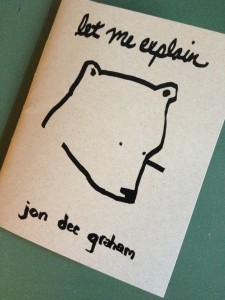 A while back, a friend handed you a mix cd, one of many he gave you over the years. Since you can remember disliking exactly one song out of the more than 20,000 that you must have heard in this friend’s presence you stuck it right in the car cd slot and turned the volume up.
A while back, a friend handed you a mix cd, one of many he gave you over the years. Since you can remember disliking exactly one song out of the more than 20,000 that you must have heard in this friend’s presence you stuck it right in the car cd slot and turned the volume up.
Like all discs from this friend, every track was unnamed: Track 1, Track 2, Track 3. Etcetera.
Track 1 began to play. A man’s deep voice came growling out of the speakers: Something very wonderful is gonna happen, something very wonderful is gonna happen. Yeah, to you. Yeah. To you.
It was one of those times when you had to pull the car over and put it in park, stop everything you were doing so that you could just sit and listen to that song. That voice. Those words. You pressed Repeat over and over, although you wouldn’t have had to – the song was part of you the minute you heard that first joyous bellow: Something wonderful is gonna happen.
“That song ‘Something Wonderful’,” you said to your friend. “Who is that?”
“That’s Jon Dee Graham,” he said.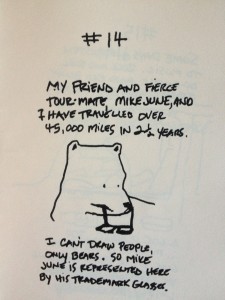
So you went to the Electric Fetus and bought the man’s discs. Played them all through, one after the other, over and over and over, the way you like, until they were embedded in you.
Based on nothing but that first listen, you conjured up a picture in your mind of Jon Dee Graham. In it, he’s sitting on the stage in a small dark bar, a single spotlight shining down on him and his guitar, and his face is lifted up to the light and he’s laughing.
You have always thought of music as the greatest and most powerful of the arts. The conjurer of feeling, of dreams, of past and future.
There’s the music you heard when you were tiny, that insinuated itself into your body like DNA. Last night you woke up at 3 a.m. with this musical DNA idea in your head, and right away the sensation of sitting on a hard wooden chair in a yellow-painted room with stained glass windows came washing over you. You felt your legs swinging against the chair, your feet barely brushing the floor. Surrounded by a dozen other tiny little kids. Jesus loves me, this I know, for the Bible tells me so.
Every word of that Sunday School song, the way those chanting kindergarten voices floated up toward the high ceiling of that yellow room, is still inside you. Even if you left that kind of church behind decades and decades ago, you can never leave its music behind. 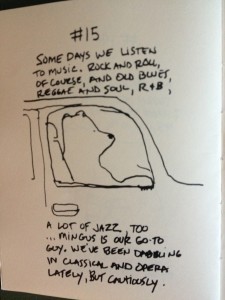
Johnny Cash, Dolly Parton, Loretta Lynn, Hank Williams: their music still sings its way through your body. You remember crouching in front of the big speaker with your ear pressed to it, the better to absorb.
Other music would come later. The Grateful Dead: when you hear it now you’re back in a hotel high in the Rockies where you cleaned rooms and vacuumed and polished and scrubbed. A place from which you walked out, at the end of the day, into the smell of sage and juniper.
Neil Young’s Comes a Time and you’re back in a cinderblock dorm room with a narrow bed and a blue wool blanket and red maple leaves pressed between wax paper and Johnson’s baby powder and a braided rag rug and college textbooks stacked on a wooden desk.
Emmylou’s Luxury Liner: an apartment down a back road in Vermont with a bathtub overlooking the mountains, stars massed overhead, a set of wooden stairs that creaked in the middle of the night, someone you loved having fallen asleep to Emmylou’s voice crooning in the darkness.
Hard to listen to those songs without being transported straight back to those times. Hard not to cry, even if those times were good and you were happy.
Then there’s another kind of music, the kind that happens when you’ve become pretty much who you are in this world. Knit together. Still and always forming, but there’s a point in life at which you have absorbed so much and experienced so much, that you start to be less a sponge and more a conduit.
This is another thing you were thinking about last night at 3 a.m., this conduit idea, but you didn’t have the words to explain it. If you had a guitar, maybe, and if you knew how to play that guitar, you could have written a song about it. Sometimes, more often than you usually admit, you want to be music instead of words.
Then the title to a Flannery O’Connor short story came to you, a title that has puzzled you forever: Everything that Rises Must Converge. For the first time it made sense, there in the darkness. If you live long enough and deep enough, something is released. Something is set free, to rise higher and higher until all like-minded souls are connected. All lost, come on home.
When you got up in the morning the word transponder was scrolling across your mind and you looked it up. “A wireless device that picks up and automatically responds to an incoming signal.”
Yeah. That feels about right –weird, but right– for the constant, invisible presence of music in a life. The give and take of it, the way it fills you up and sets you thrumming and then you send it out into the world.
Everything that rises must converge. That means that unrise-able things, things like wanting fame and riches and to make sure that everyone knows how accomplished you are, have to be let go.
Only connect. That line, from a novel written in the 1860′s, has stayed famous for so long because it’s true. It’s what everyone cares about. It’s the one thing that matters.
You’ve been thinking about that lately, along with this line from your favorite childhood book: To look at everything always as though you were seeing it either for the first or last time: Thus is your time on earth filled with glory.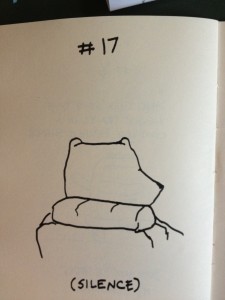
It’s not an easy thing to do. To look upon something as if you were seeing it for the first or last time means that all of life becomes even more intense. Light shines down on everyone and everything is infused with beauty and sorrow and wonder and gratitude. No, it’s not easy to live like that.
That’s how Jon Dee Graham lives, though. You knew it the first time you heard that first song. Something very wonderful is gonna happen. When you wake up with that familiar, huge feeling of happiness, so happy just to be alive, that’s the song you think of.
When you sit on your porch and watch the girls in their summer dresses walking by, you think of his song Amsterdam, and how all the people in it are beautiful.
When it has been a long stretch of sadness and sorrow and exhaustion, and it feels, finally, as if maybe it wouldn’t be so bad just to lie down and sleep for a long, long time, or even just. . . disappear, his song Swept Away comes over you. Life is difficult at times, he says. I’ve fought depression my whole life.
Jon Dee’s music doesn’t bring you back to a long-ago time. It doesn’t remind you of who you used to be, in your time here on this earth. His music is who you are right here, right now, at this mid-life transponder age. It’s a big sweet life. What can you do but thank him for putting that feeling, and those words, to music.
Jon Dee Graham: I have an extremely strong belief in something I can’t explain.
*This Friday night, August 23, Jon Dee Graham (who lives in Austin, TX) will be playing at Morrissey’s Irish Pub in the Uptown neighborhood of Minneapolis. Be there.
August 17, 2013
Andes Mint #30: Poem of the Week, by Sara Teasdale
– Sara Teasdale
I went out at night alone;
The young blood flowing beyond the sea
Seemed to have drenched my spirit’s wings—
I bore my sorrow heavily.
But when I lifted up my head
From shadows shaken on the snow,
I saw Orion in the east
Burn steadily as long ago.
From windows in my father’s house,
Dreaming my dreams on winter nights,
I watched Orion as a girl
Above another city’s lights.
Years go, dreams go, and youth goes too,
The world’s heart breaks beneath its wars,
All things are changed, save in the east
The faithful beauty of the stars.
–
For more information on Sara Teasdale, please click here: http://www.poetryfoundation.org/bio/sara-teasdale
–
My Facebook page: http://www.facebook.com/home.php?#!/pages/Alison-McGhee/119862491361265?ref=ts

